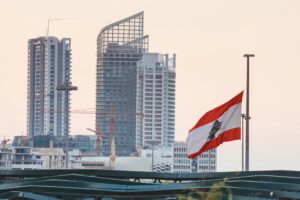Lebanon’s real estate sector remains one of the most recommended investment opportunities, even amid ongoing economic volatility.
Beyond property, investment opportunities in Lebanon are growing in areas such as technology, renewable energy, and agribusiness, driven by a resilient local market and strong diaspora ties.
In this guide, we’ll explore:
- Which sector has the best investment opportunities in Lebanon
- Can I buy land in Lebanon?
- Is there a stock market in Lebanon?
- How to invest in Lebanon as a foreigner
- Alternative investment opportunities in Lebanon
- Is it a good idea to invest in Lebanon?
If you are looking to invest as an expat or high-net-worth individual, you can email me (hello@adamfayed.com) or WhatsApp (+44-7393-450-837).
This includes if you are looking for a free expat portfolio review service to optimize your investments and identify growth prospects.
Some facts might change from the time of writing. Nothing written here is financial, legal, tax, or any kind of individual advice or a solicitation to invest. Nor is it a product or service recommendation.

Is Lebanon a Good Place to Invest?
For seasoned investors seeking high-upside frontier markets and who can navigate local complexities, Lebanon may be worth considering. Conservative investors may prefer more stable MENA destinations like the UAE or Jordan.
Lebanon offers compelling opportunities in sectors like tech, real estate, and healthcare, especially for diaspora investors or those with high risk tolerance.
However, its volatile political climate, currency instability, and regulatory uncertainty mean it’s not suited for all profiles.
What is a Good Investment in Lebanon?

While traditional sectors like banking and real estate have historically dominated Lebanon’s economy, new trends have emerged as more promising in 2025:
- Technology and Startups
Beirut continues to foster a vibrant startup scene, fueled by a young, educated, and tech-savvy population. Diaspora investment remains a key funding source, and sectors like fintech, AI-based services, and e-commerce platforms are showing sustained growth. The Central Bank’s Circular 331 initiative, though scaled down, helped create a foundation for digital innovation that still attracts venture capital and regional interest. - Renewable Energy
Chronic electricity shortages and dependency on expensive fossil fuels have made renewable energy a high-priority sector. Solar panel projects for residential and industrial use, as well as small-scale wind installations, are increasingly viable thanks to donor-backed incentives, World Bank support, and net metering policies. Foreign investors are finding opportunities in private off-grid energy systems and local energy cooperatives. - Agribusiness and Agro-Processing
With Lebanon’s fertile land and favorable climate, sustainable agriculture is becoming more profitable. There’s growing demand for organic produce, food security initiatives, and agritech solutions. Export-driven ventures in olive oil, wine, herbs, and dried fruits are also gaining ground, especially with international aid agencies helping bridge infrastructure gaps. - Tourism Revival
After years of decline, Lebanon’s tourism sector is slowly rebounding. Investments in boutique hotels, eco-tourism lodges, and heritage-focused travel experiences are re-emerging as viable options. Improved domestic security and a return of diaspora tourists have renewed optimism in this once-lucrative sector. The Cedars ski resort region, Batroun coast, and Bekaa Valley wine trails are among areas drawing attention.
Can a Foreigner Buy Property in Lebanon?
Yes, foreigners can legally purchase property in Lebanon, although there are conditions:
- Legal Requirements: Foreigners must obtain a decree of the Council of Ministers for land purchases exceeding 3,000 sqm.
- Ownership Cap: Foreign ownership is limited to 3% of the total area of the country (10% in Beirut).
- Tax Considerations: Property registration fees and real estate taxes apply, but Lebanon does not levy capital gains tax on property sales.
Foreign investors are increasingly buying apartments in Beirut and coastal cities for residential and rental income purposes.
How to Invest in the Stock Market in Lebanon
To invest in the stock market in Lebanon, you must open an account with a licensed local broker, fund it with fresh USD, and trade through the Beirut Stock Exchange (BSE).
While possible for foreigners, the market is small, illiquid, and impacted by Lebanon’s broader economic volatility.
How does the Beirut Stock Exchange work?
The Beirut Stock Exchange (BSE) is Lebanon’s primary and only stock exchange.
Historically underutilized, it lists a small number of companies, mostly in banking, real estate, and manufacturing.
The BSE is regulated by the Capital Markets Authority (CMA) and operates as a self-regulated body.
However, trading volumes are relatively low, and liquidity is limited due to macroeconomic instability and the size of the market.
As of 2025, the BSE still functions but remains modest in scale compared to regional exchanges.
Can Foreigners Trade on the BSE?
Yes, foreign investors can trade on the BSE without major legal restrictions.
There are no capital controls specific to stock investments, though broader currency transfer limitations and banking sector instability may pose challenges for repatriating funds or executing large trades.
Risks and Limitations When Investing in BSE
- Low market liquidity: Making it difficult to enter or exit large positions
- Political and economic volatility: Which can significantly affect listed companies
- Limited listings: Only a small number of stocks are actively traded
- Transparency and disclosure: May not always align with international standards
Due diligence is essential, especially for long-term investments.
Alternative Exposure: Regional Comparisons
Investors seeking stock market exposure with more stability may also consider:
- Egypt’s EGX, with broader listings and high liquidity in sectors like banking, construction, and telecom
- Dubai (DFM) and Abu Dhabi (ADX), which offer exposure to tech, energy, and real estate in more regulated environments
- Qatar or Saudi Arabia, for institutional investors seeking large-scale public offerings or blue-chip regional stocks
Lebanon Compared to Other MENA Investment Destinations
| Feature | Lebanon | UAE | Egypt | Jordan |
| Foreign Ownership | Allowed in most sectors; minimal restrictions | UAE allows 100% ownership in over 1,000 sectors | Growing openness; property ownership capped to two units ≤ 4,000 sqm per property | Restrictions persist in particular sectors |
| Real Estate Access | Foreigners can purchase property with restrictions (e.g. land size limits, approvals) | Open; foreigners and companies in free zones can own property directly | Non-Egyptians may own up to two residential properties (max 4,000 sqm each) | Non-residents face restrictions; limited ownership rights in certain areas |
| Economic Stability | Highly volatile: GDP shrank ~40%, inflation >200%, extreme currency depreciation | Stable and diversified: USD $30 B+ FDI in 2023, ongoing reforms, low sovereign risk | Mixed: Implementing reforms under IMF support but vulnerable to shocks; inflation high (~36%) | Moderate: Better institutional stability than Lebanon; IMF support and gradual reform |
| Key Investment Sectors | Tech, renewable energy, tourism revival, agribusiness, real estate | Real estate, fintech, AI, logistics, tourism, energy | Infrastructure, agriculture, energy transition, tourism; leveraging Suez and export growth | Healthcare, logistics, tourism services, small-scale manufacturing; some stability in government reforms |
Pros and Cons of Investing in Lebanon
Pros
- 100% Foreign Ownership Allowed in Most Sectors
Lebanon allows full foreign ownership without requiring local partners in most industries, including real estate (within size limits), services, and manufacturing. This legal flexibility makes it easier for international investors to retain control and profits. - Dollarized Economy (USD Used in Parallel with LBP)
Despite the Lebanese pound’s devaluation, the widespread use of the US dollar in transactions especially in real estate, tech, and tourism, provides a measure of financial predictability and investor confidence. - Educated, Multilingual Workforce
Lebanon boasts one of the most educated populations in the MENA region. Many professionals are fluent in English, French, and Arabic, making the country ideal for service-based sectors like tech outsourcing, education, and international trade. - Strategic Location for Trade and Logistics
Positioned at the crossroads of Europe, Asia, and Africa, Lebanon offers easy access to major shipping routes and regional markets. The Port of Beirut and proximity to the Gulf states enhance its role as a re-export and distribution hub.
Cons
- Political Instability and Regulatory Unpredictability
Frequent government changes, sectarian power struggles, and weak institutions can delay reforms and complicate long-term planning. Business regulations may change abruptly, and enforcement can be inconsistent. - Currency Devaluation and Banking Sector Fragility
The Lebanese pound (LBP) has seen sharp depreciation since 2019, and the banking system continues to face capital control restrictions, frozen deposits, and low liquidity, posing risks for investors relying on local financing or capital repatriation. - Limited Access to Financing and Capital Controls
Borrowing from local banks is challenging due to tight credit conditions and limited trust in the financial system. Foreign investors may need to self-finance or seek external funding, as moving large sums in and out of the country remains restricted. - Infrastructure Challenges in Energy, Transport, and Public Services
Lebanon suffers from daily power outages, underdeveloped public transport, and strained water and waste systems. These issues increase operational costs, especially for industrial, tech, and hospitality ventures.
Investor Tips in Lebanon
- Engage a local lawyer for due diligence
Navigating Lebanon’s regulatory environment requires local legal expertise to avoid hidden liabilities or permit delays. - Leverage diaspora connections or joint ventures
Partnering with Lebanese expats or local operators can ease market entry, reduce cultural friction, and boost credibility. - Use secure remittance or escrow solutions
Given capital controls and banking sector volatility, work with trusted international transfer services or escrow accounts to safeguard your funds. - Start lean with digital or service-based ventures
Minimize exposure by piloting small-scale businesses like digital marketing, consulting, or freelance tech services. - Stay updated on exchange rates and policy shifts
Monitor currency trends and regulatory developments closely, as Lebanon’s financial landscape can change quickly.
Conclusion
Despite its risks, Lebanon remains a niche but potentially lucrative destination for foreign investors willing to take a long-term view.
Proper due diligence, local partnerships, and awareness of legal conditions are essential to maximizing returns while navigating volatility.
As regional cooperation grows and reforms continue, Lebanon’s investment landscape may continue to evolve in surprising ways.
Pained by financial indecision?

Adam is an internationally recognised author on financial matters with over 830million answer views on Quora, a widely sold book on Amazon, and a contributor on Forbes.



